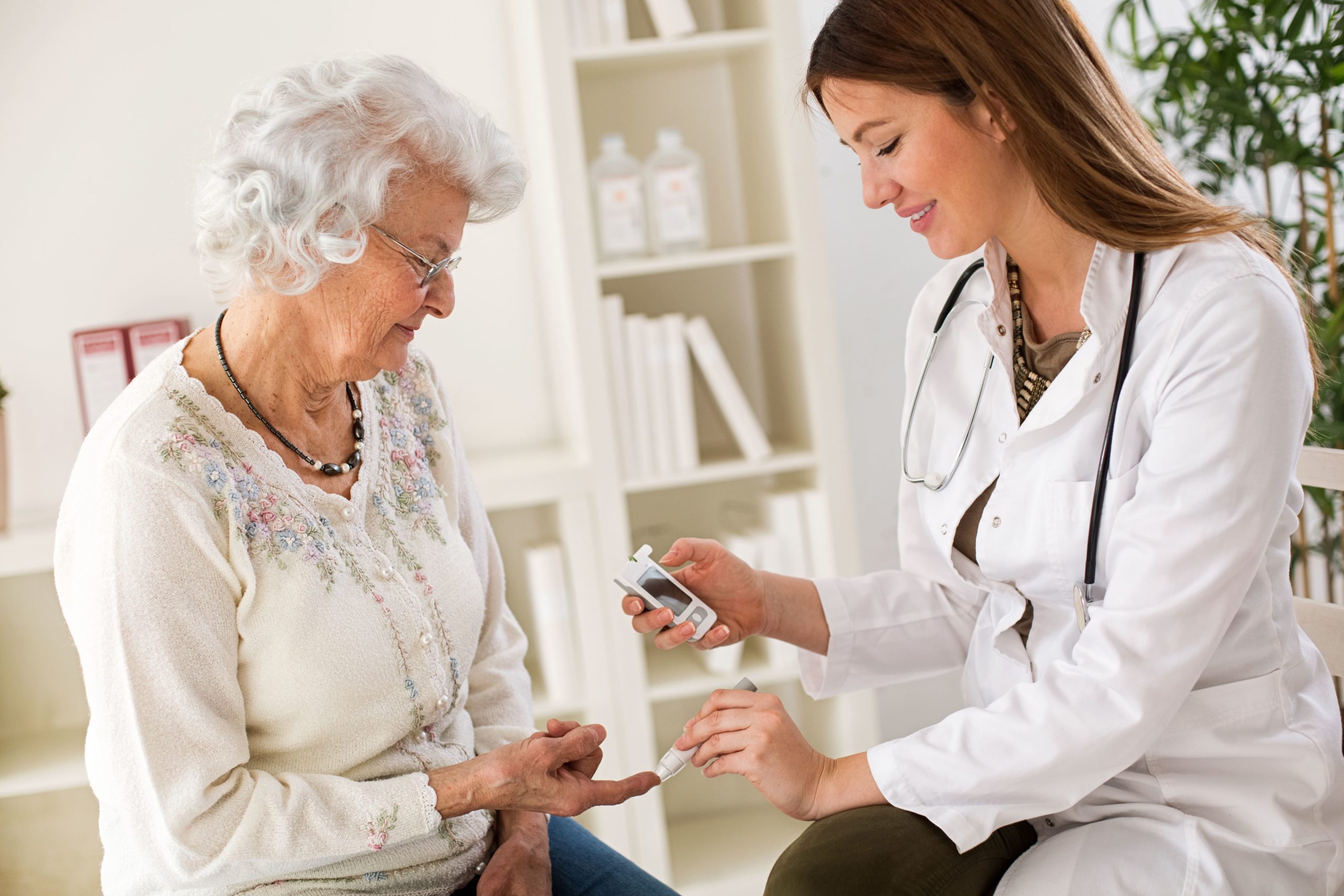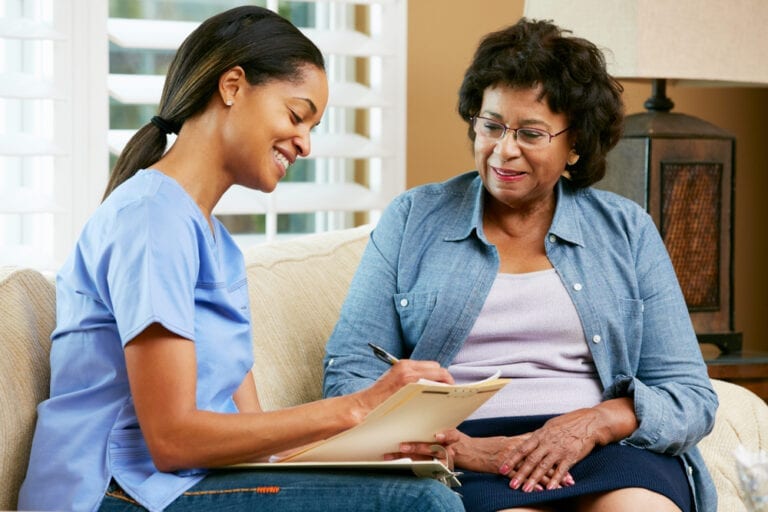The Centers for Disease Control and Prevention states that more than 25% of adults over 65 have diabetes (CDC). For Type 2 diabetes, the most prevalent form of the illness, age is a major risk factor.
Diabetes complications
Diabetes complications can be quite serious. Infection risks are heightened by diabetes. The heart, kidneys, nerves, and eyes can all be harmed by it. It makes dementia, incontinence, and falls more likely. Both the quality and quantity of life are decreased.
Diabetes can, fortunately, be controlled. Some senior citizens can control their blood sugar levels with lifestyle adjustments such as improved eating habits, more activity, giving up smoking, and keeping a healthy weight. Medications may be prescribed by the doctor in the form of tablets, shots, or an insulin pump. Individuals with diabetes need to periodically check their blood sugar levels and see their doctor.
Diseases requiring home care
Senior people sometimes have various diseases requiring home care, which further complicates problems. According to the National Diabetes Education Program, family support is crucial for helping people with diabetes manage their condition daily. Although family members frequently assist, it might occasionally seem like a full-time job! It’s a good idea to go over these 10 pieces of advice as more family members will be playing this caring function as the population ages.
- Assist your seniors and schedule visits with their in-home healthcare staff
- Attend appointments with me
- Get as much knowledge as you can about your senior’s health
- Help with medicine administration
- Use your imagination when cooking
- Encourage your elder to get more active
- Assist the elderly in looking at their feet
- Keep power battles at bay
- Make the health of your senior member a family concern
- Consult experts for assistance
Assist your seniors and schedule visits with their in-home healthcare staff.
The patient may need to communicate frequently with their primary care physician, endocrinologist, ophthalmologist, podiatrist, and other specialists as needed to manage their diabetes. Then there are excursions to the drugstore, a fitness class, or possibly a support group for quitting smoking. Diabetes side effects like nerve damage and eyesight loss can make driving risky or difficult for your loved one. If you can’t handle all the driving, assist your loved one in using other modes of transportation, such as ride-hailing services, public transportation, or senior transportation. Moreover, Right at Home carers offer transportation and aid clients in scheduling appointments.
Attend appointments with me.
Your seniors must adhere to the doctor’s instructions about medication administration and the monitoring and recording of blood sugar levels. But with so much information available, kids can feel swamped and overloaded. A second pair of ears and moral support are beneficial. The importance of family and other support systems in helping people manage their diabetes is being acknowledged by home care providers today. Make notes, and assist your loved one in creating questions in advance. Professional Right at Home carers can also be a valuable source of emotional support by going to appointments with your loved one and communicating with you.
Get as much knowledge as you can about your senior’s health.
Verify facts from reliable sources online. The doctor who treats your loved one is the best source of information. Ask any questions you may have, such as what to do if your blood sugar falls too low and the symptoms of that.
Help with medicine administration.
Your senior citizens may take medication to manage their blood sugar. If that is insufficient, they may use an insulin pump or administer insulin injections using a syringe or a pen. Consult the doctor about what you can do to assist. Help the person you care about remember which drugs to take when and how. Check into how alarms, a chart, or pill boxes can help them stay on top of everything and on time. Voice helpers are also beneficial. Your loved one’s prescriptions for all medical conditions should be reviewed by the doctor or pharmacist at least once a year.
Use your imagination when cooking.
Diet is one of the most crucial factors in blood sugar regulation. The doctor of your loved one would probably advise a diet that has fewer sugars and carbohydrates, which are present in pasta, potatoes, rice, tortillas, and desserts. Instead, diabetics should increase their intake of vegetables and proteins. Meal timing and portion size are also important. However, it might be upsetting to alter lifelong dietary habits! Help your loved one revamp their pantry and refrigerator and make healthier cooking changes.
Encourage your elder to get more active.
Exercise is a top technique to control blood sugar together with proper nutrition. The doctor of your loved one might provide an appropriate fitness regimen that includes both aerobic and muscle-building exercises. This might be a home workout or an exercise class. Ask the doctor about chair exercises, a chair exercise class, or a water fitness program if your loved one is unable to safely walk. You can support us! Also, you’re getting more exercise for yourself by going on a walk with your loved one rather than talking on the couch.
Assist the elderly in looking at their feet.
Individuals who have diabetes-related nerve impairment may not recognize blisters, calluses, or foot injuries until a dangerous infection has taken hold. Amputations might result from this. Frequent inspection can identify issues before they become serious, but if your loved one has poor vision and flexibility, it may be challenging. Inform your doctor straight away if you have any wounds, blisters, swelling, or redness. Assist your loved one in maintaining clean, dry feet and well-trimmed nails. Encourage your loved one to wear comfortable shoes and slippers even around the house because being barefoot increases the risk of suffering a foot injury.
Keep power battles at bay.
When you get to your father’s place, the coffee table is covered in candy wrappers. You ask, “Dad, should you be eating that?” Dad urges you to mind your own business even though all you want is for him to be healthy. This is a perfect illustration of the age-old conflict between independence and safety that exists between elders and the people they care about! Assure your loved one that you are preserving their independence by helping them maintain their health. If you can, try to keep your sense of humor.
Make the health of your senior member a family concern.
Since it is. If one relative gets diabetes, there is a higher hereditary risk for others to do so as well. Moreover, lifestyle decisions can run in families. Establish healthy eating and exercise routines in your household. You can then tell your mother, “Mom, I made this healthy lunch for you, but it’s also fantastic for my health!” Good lifestyle improvements can spread like wildfire, teaching future generations valuable lessons.
Consult experts for assistance.
There may come a point when you can’t handle it by yourself. You may live several hours away from your loved one because you have a career, children, and other commitments. According to studies, many carers put their health at risk by juggling many tasks.
Home Care Services
Seniors who are coping with complex home care or health challenges may find that transferring to an assisted living or other supported living community is their best option. Professional in-home care can be a huge source of help if your loved one lives with you or wishes to stay in their own home. For customers with diabetes, Right at Home’s in-home carers with professional training offer a wide range of services, including:
- Support in organizing appointments and activities related to managing diabetes.
- Assistance with nutrition, which includes grocery shopping and meal planning.
- Monitoring and support as your loved one adheres to the doctor’s “prescription” for exercise.
- Supportive company to lift your loved one’s spirits and prevent depression, which is so prevalent among elderly people with diabetes.
- Caregiver stress reduction through respite care and an extra set of hands.
- Transportation to and from any necessary or desired locations, including medical visits and exercise programs.
- Personal care and housekeeping to keep your loved one secure and at ease at home.
Home Care Near Me Let’s Get Started!
Get Immediate Help with Information, Costs & Payment Options.







